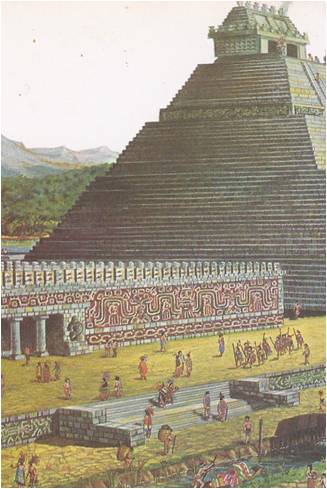Even though you are familiar with the story of the American Revolution, perhaps you do not realize that only nine short days at Christmas time in 1776 changed the course of the English colonies’ fight for freedom. Within that short space of time, General Washington’s ragged, dwindling army captured the hired German troops at Trenton, New Jersey and routed a British force at nearby Princeton. To win such surprising victories and to keep the American Revolution from collapsing took the devoted leadership and military skill of General George Washington. It took patriot soldiers whose term of service had run out …
Read More »Tag Archives: Mexico
Europeans Explore and Settle Other Lands
Visitors to the Portuguese city of Lisbon, on a certain day in 1499, would have found the people in a holiday mood. Groups of townsmen who gathered here and there talked excitedly about the arrival of two ships and there was good reason. In the two years since these vessels had sailed down the river and slipped out of sight, they had completed the first trip from Europe around Africa to India and back. Such an event indeed deserved to be celebrated. Not only had the fearless captain of this expedition, Vasco da Gama, performed a great feat of navigation, …
Read More »The United States and Destiny 1848-1914
THE UNITED STATES entered the race for colonies last of all the powers, at the end of the nineteenth century. Long before then, however, Americans were accustomed to taking over territory; they had, in fact, built their country westward from the Atlantic by settling lands they had bought or seized. In the Mexican War of 1845-48 they had taken a huge tract of land from Mexico by force. Many Americans, including Abraham Lincoln believed that the Mexican War was simply an invasion of a weak country by its powerful, land hungry neighbour. Others maintained that the move was justified by …
Read More »Another Napoleon 1848-1906
IN DECEMBER of 1848, the French elected Louis-Napoleon Bonaparte as president of the Second French Republic. What he stood for was not very clear, but to most Frenchmen that did not seem important. He was the nephew of the great Napoleon and the very sound of his name stirred them like a battle-cry. Since the defeat of the first Napoleon in 1815, there had been little in French politics to capture the imagination. As the years passed, the French looked back on the Napoleonic era as the time of their greatest glory. The writer Victor Hugo wrote poems about Napoleon. …
Read More »The Civil War 1860-1865
AS THE Presidential elections of 1860 drew near, the Democratic party was as hopelessly divided as the nation. The Southern Democrats broke away from the party and nominated John C. Brekinridge of Kentucky as their candidate. He demanded that Congress pass laws protecting slavery in all the American territories, whether the people of the territories wanted slavery or not. Democrats from the northern and border states nominated Stephen A. Douglas, who promised to allow each new state in the West to decide the slavery question tor itself by popular vote. With the Democrats divided, the Republicans were almost certain to …
Read More »A House Divided 1833 – 1859
BEFORE ELI Whitney invented the cotton gin, Southern plantation owners were beginning to wonder if they should not give up their slaves. There was a good market for cotton; the English were buying all the cotton they could get to make into cloth in their new factories. It took too long to separate raw cotton from the seed and raising cotton simply did not pay. If the plantation owners stopped raising cotton, they would really have no need for slaves. Then after the invention of the cotton gin, raising cotton began to pay — and pay well! Cotton became the …
Read More »Adventures in the New World 1519 – 1620
“I DID NOT come to till the soil like a peasant,” said Hernando Cortez. “I came to find gold.” His words echoed the thoughts of almost every Spaniard in the New World. The discovery of the sea route to the West had set off a great treasure hunt. Colonizing and slaughtering, building and plundering, the gold-hungry Spaniards won a Spanish Empire of the West. Conquistadores‚ they were called — the conquerors. None of the treasure-hunters was more cunning or ambitious than Hernando Cortez‚ who came to the island of Hispaniola in 1504. It was not until 1519 that the governor …
Read More »





